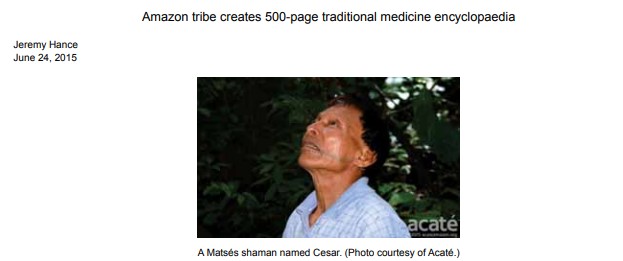(UNESP - 2016 - 2 fase)In one of the great tragedi
(UNESP - 2016 - 2ª fase)

In one of the great tragedies of our age, indigenous traditions, stories, cultures and knowledge are winking out across the world. Whole languages and mythologies are vanishing, and in some cases even entire indigenous groups are falling into extinction. This is what makes the news that a tribe in the Amazon – the Matsés peoples of Brazil and Peru – have created a 500-page encyclopaedia of their traditional medicine all the more remarkable. The encyclopaedia, compiled by five shamans with assistance from conservation group Acaté, details every plant used by Matsés medicine to cure a massive variety of ailments. “The [Matsés Traditional Medicine Encyclopaedia] marks the first time shamans of an Amazonian tribe have created a full and complete transcription of their medicinal knowledge written in their own language and words,” said Christopher Herndon, president and co-founder of Acaté. The Matsés have only printed their encyclopaedia in their native language to ensure that the medicinal knowledge is not stolen by corporations or researchers as has happened in the past. Instead, the encyclopaedia is meant as a guide for training new, young shamans in the tradition and recording the living shamans’ knowledge before they pass. “One of the most renowned elder Matsés healers died before his knowledge could be passed on so the time was now. Acaté and the Matsés leadership decided to prioritize the Encyclopaedia before more of the elders were lost and their ancestral knowledge taken with them,” said Herndon. Acaté has also started a program connecting the remaining Matsés shamans with young students. Through this mentorship program, the indigenous people hope to preserve their way of life as they have for centuries past. “With the medicinal plant knowledge disappearing fast among most indigenous groups and no one to write it down, the true losers in the end are tragically the indigenous stakeholders themselves,” said Herndon. “The methodology developed by the Matsés and Acaté can be a template for other indigenous cultures to safeguard their ancestral knowledge.”
Comments:
Hugh Baker – Top Commenter
The priority for people supporting the Matsés should be to copyright the encyclopaedia in as many jurisdictions as possible, protecting both the medicinal knowledge and the biological/botanical information, species of plants, fungi, insects and animals that occur in the range of the tribe. Any pharmacological corporations wishing to capitalize on the knowledge would have to pay royalties to the Matsés, and would also need to consult with the Matsés in a meaningful interaction about how they intend to exploit whatever resource in which the company expresses an interest.
(http://news.mongabay.com. Adaptado.)
O que motivou o grupo ambientalista Acaté e os cinco pajés a organizarem a Enciclopédia de Medicina Tradicional da tribo Matsés?


